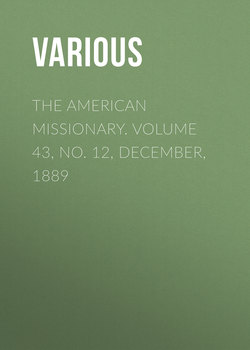Читать книгу The American Missionary. Volume 43, No. 12, December, 1889 - Various - Страница 12
FORTY-THIRD ANNUAL MEETING
THE MISSIONARY VIEW OF THE SOUTHERN SITUATION
ОглавлениеBY SECRETARY A.F. BEARD
The Southern problem is a National peril. Problems are not always perils. This is a problem large with political and religious perils, and whether political or religious it can not be ignored, nor can its consideration be postponed. It is here. It is our problem. It is nearer to the South, and more immediate, than to the North, but it is ours. We are not foreigners in any part of this country. It has been settled once for all that we are to be fellow citizens in a common country when we come from Boston to Chicago and when we go from New York to New Orleans. The problem which belongs to a country to which we belong, is ours. This might as well be understood. We have no right to take our hands off from that of which we are a part and which is a part of us. No part can say to another, it is not your concern.
This is true politically. Thrice true is it religiously—Christian faith is not confined to State boundaries. It belongs everywhere. The problem is not a new one. It has its roots bedded deep in history. When years ago it began to be discussed by a few they were called agitators, as if the discussion of right and wrong were itself a wrong, as if the letting in of light upon the darkness were a deed of darkness. Nevertheless, the Nation became thoughtful over the question of the rights of man. While it was musing the fire burned, and an irrepressible conflict came. In the issue it was settled that no man should be held by another man in involuntary servitude in this common and inseparable country.
A quarter of a century has elapsed since this settlement of a problem which involved the destiny of two races, and of our whole country. The question now before the Nation and before the churches is a corollary of slavery. It is the second section of the first chapter. The first question was: How shall liberty be proclaimed to the captive and the enslaved become free? The second is: Being free, how can the two races—as distinct and separate as are the white and black races of the South—now equal before the law, live side by side under the same government, and live in Christian truth and peace? This is the problem, and, like the first, it is irrepressible.
In one sense it is a new question—that is, a new generation of white people has in part come forward to participate in the duties of citizenship, since all men became men in the law of the land. To them the question is practically new. The situation as they find it, is this: The Negroes, who, twenty years ago, were four millions, are now eight millions. The increase of the blacks above the increase of the whites in the period of twenty years, is fourteen per cent. In his work on the African in the United States, Professor Gilliam, having in hand the figures of our Census Bureau, forecasts with the demonstration of mathematics our population one century hence. We do not know what may modify his figures, but he computes that at the present rate of increase there are to be in the old slave States in one hundred years, ninety-five millions of whites and double this number of African descent. Therefore, whatever may modify, it is probable that before one half an hundred years are over, the numbers of the blacks will furnish them sufficient guarantee for their legal rights.
There are those in this presence who have seen the population of this republic multiply itself nearly three times. Our childhood's geography taught us that twenty-three millions of people lived in the United States. Now our children learn that there are sixty millions. Twenty years ago four millions of Negroes and eight millions to-day. Therefore, as large as the problem now is to us, it will be greater for our children if we err in our solution of it.
This race of African descent has been declared by constitutional enactment to be entitled to whatever privileges belong to man, as man. Standing on this, and beginning with nothing but the heredity of hindrances, with the brand of color and the prejudice of race against them, this people have climbed up from their low estate with a remarkable progress. They have applied themselves to take hold of knowledge as no other people ever did in the annals of history. They have made great inroads upon their previous illiteracy. They have rapidly acquired property. They have developed industrial skill, and established the evidences of business facility. They have shown themselves capable of good citizenship, both in the understanding of its duties and the practice of them. They have vindicated the act of emancipation and the decrees of citizenship.
Yet to-day their standing both as citizens and as Christians is opposed. The question of their rights is discussed as if it were an open one, and in the South it is coming to be increasingly denied. Under the plea that it is unsafe for the black man to exercise his civil rights, there arises a condition of affairs that can have no standing under our government except a revolutionary standing. And the question whether the rights of man as man shall be regarded, is to-day a more pressing question than it has been at any previous time since the slaves were declared to be men.
